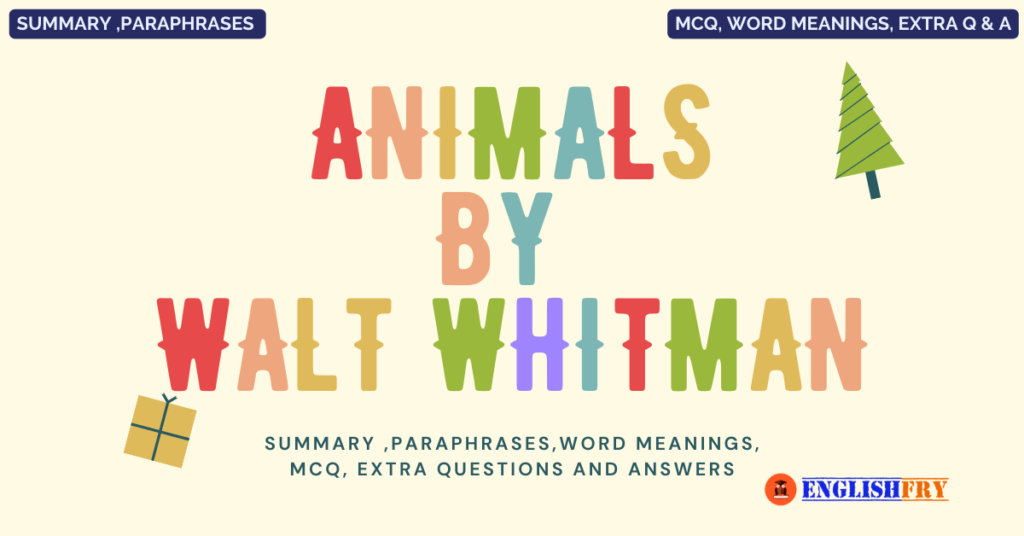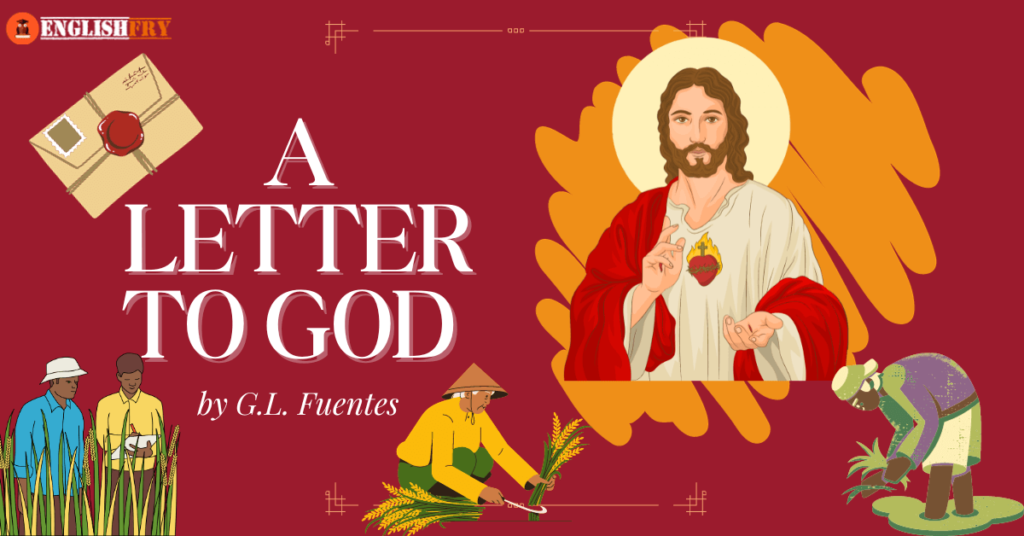About the Poet

Poet : Walt Whitman was born on 31st May, 1819 and he passed away on 26th March, 1892. He
was an acclaimed American Poet, Essayist and Journalist. He is generally regarded as the father
of Free Verse. Among his most popular poems are – ‘O Captain! My Captain!’, ‘O Me! O Life!’.
‘Out of the Cradle Endlessly Rocking’, ‘I Hear America Singing’, Leaves of Grass, Song of
Myself, etc.
Summary
In this summary of Animals by Walt whitman we go into the the pinnacle of wildlife embodied inside Walt Whitman’s poetry lines . The poem “Animals” finds refuge within Whitman’s magnum masterpiece, “Song of Myself,” which is nested within Leaves of Grass. The renowned bard celebrates the virtues of the animal kingdom here, portraying them as paragons superior to human frailties. Whitman longs for a life in the company of animals, a world free of lamentations and moral sins.
The crux of this poetic narrative is a comparison of the human plight with that of our fellow terrestrial creatures, rather than an adulation of the animal realm’s superiority. The poet proffers the notion that eons ago, our species once held dominion over traits such as serenity, avarice’s dearth, and a perpetual euphoria, only to have squandered these virtues over the aeons. In “Animals,” Whitman imparts a didactic message, an admonishment to the human psyche, harkening back to a bygone era.
Unlocking the Beauty of Animals: Walt Whitman’s Perspective
In the vast canvas of creation, both humanity and animals were lovingly crafted by the divine. Yet, within this intricate tapestry of existence, humanity was granted a unique status by God. However, Walt Whitman, the renowned American poet, offered a contrasting viewpoint. He saw in animals qualities that sometimes outshone those of humans, and he artfully conveyed these insights in his poem, “Animals.”
The Poet’s Deep Affection for Animal Companionship
Walt Whitman’s heart harbored a profound affection for the companionship of animals. He yearned to immerse himself in their world, believing that animals embodied virtues often absent in humans. Animals radiated tranquility and self-sufficiency, embracing their circumstances without complaint. Their lives were a testament to perpetual contentment, as they faithfully fulfilled their roles in the divine order. Unlike humans, animals consistently exhibited love and respect for their human counterparts. They lived lives untainted by materialistic obsessions or undue reverence for their predecessors. For animals, both joy and sorrow held equal significance.
Humanity’s Ongoing Struggle with Materialism
In stark contrast, humanity found itself ensnared by the clutches of materialism. Nights were spent in restless contemplation of past misdeeds, and trivial matters often ignited tempers. Animals, however, reveled in the simplicity of existence. They did not waste precious moments pondering their obligations to the divine, a preoccupation that often plagued humans. Walt Whitman astutely observed that humans were lacking in the virtues possessed by animals, virtues such as love, serenity, kindness, selflessness, honesty, patience, and empathy. These virtues, he believed, were the cornerstones of a truly fulfilling life.
The Poet’s Aspiration to Emulate the Animal Way
Walt Whitman nurtured a profound desire to learn from animals, inspired by their unwavering authenticity. He marveled at their virtues and longed to assimilate them into his own life, even though he had once taken them for granted. He perceived human existence as burdened with stress, depression, anxiety, and discontent. Consequently, he yearned to distance himself from his fellow humans and immerse himself in the embrace of animals. He believed that authentic happiness resided among these creatures and, in pursuit of this elusive joy, sought to establish a deep connection with them.
Conclusion: A Reverent Ode to Animal Virtues
In his poem “Animals,” Walt Whitman pays a heartfelt tribute to the remarkable virtues embodied by animals. He not only admires them but also laments that many of these virtues have been overshadowed or forgotten by humanity. In the end, Whitman’s words serve as a poignant reminder of the simple yet profound wisdom that animals bring to our shared existence.
Original Poem
Animals written Walt Whitman I think I could turn and live with animals, they are so placid and self-contain'd, I stand and look at them long and long. They do not sweat and whine about their condition, They do not lie awake in the dark and weep for their sins, They do not make me sick discussing their duty to God, Not one is dissatisfied, not one is demented with the mania of owning things, Not one kneels to another, nor to his kind that lived thousands of years ago, Not one is respectable or unhappy over the whole earth. So they show their relations to me and I accept them, They bring me tokens of myself, they evince them plainly in their possession. I wonder where they get those tokens, Did I pass that way huge times ago and negligently drop them?
Word Meanings
| Word | Meanings |
|---|---|
| Placid | Calm, peaceful, and undisturbed. In the context of the poem, it describes the serene nature of animals. |
| Self-contain’d | Self-contained, self-sufficient, and self-reliant. This term highlights the independence of animals. |
| Sweat and whine | In this context, it refers to complaining and fretting. Animals do not complain about their conditions, unlike humans. |
| Lie awake in the dark | Suggests staying awake at night, often due to worry or guilt. Animals do not experience insomnia like humans. |
| Demented | Mentally disturbed or insane. The poem indicates that animals are not mentally troubled. |
| Mania of owning things | A strong, obsessive desire for material possessions. Animals do not have this intense need to accumulate possessions. |
| Kneels to another | This phrase signifies submission or subservience to someone else. Animals do not display such hierarchical behavior. |
| Respectable | Worthy of respect or admiration. Animals, in the poet’s view, do not seek or require respect. |
| Tokens of myself | In the context of the poem, this could mean symbols or reminders of the poet’s own essence or identity. |
| Negligently | Carelessly or without proper attention. The poet wonders if he had passed by these animals in the past and unintentionally left behind reminders of himself. |
Paraphrases for each line of the poem:
1. Original Line: “I think I could turn and live with animals, they are so placid and self-contain’d,”
Paraphrase: “I believe I could change my life and live alongside animals because they are calm and self-sufficient.”
2. Original Line: “I stand and look at them long and long.”
Paraphrase: “I stand and observe them for extended periods of time.”
3. Original Line: “They do not sweat and whine about their condition,”
Paraphrase: “They don’t fret and complain about their circumstances.”
4. Original Line: “They do not lie awake in the dark and weep for their sins,”
Paraphrase: “They don’t stay up in the darkness, shedding tears over their wrongdoings.”
5. Original Line: “They do not make me sick discussing their duty to God,”
Paraphrase: “Their conversations about their obligations to God don’t distress me.”
6. Original Line: “Not one is dissatisfied, not one is demented with the mania of owning things,”
Paraphrase: “None of them are unhappy or obsessed with possessing material things.”
7. Original Line: “Not one kneels to another, nor to his kind that lived thousands of years ago,”
Paraphrase: “None of them bow down to one another or to their ancestors from ancient times.”
8. Original Line: “Not one is respectable or unhappy over the whole earth.”
Paraphrase: “None of them strive to gain respect or are discontented throughout the entire world.”
9. Original Line: “So they show their relations to me and I accept them,”
Paraphrase: “They demonstrate their connection to me, and I embrace it.”
10. Original Line: “They bring me tokens of myself, they evince them plainly in their possession.”
Paraphrase: “They bring me evidence of my own essence, displaying it clearly in what they have.”
11. Original Line: “I wonder where they get those tokens,”
Paraphrase: “I ponder where they acquire these signs of my inner self.”
12. Original Line: “Did I pass that way huge times ago and negligently drop them?”
Paraphrase: “Did I traverse that path long ago and carelessly leave these signs behind?”
Explanation
Walt Whitman feels like living in the world of animals. Their world attracts him a lot due to their qualities. They are the sole owners of virtues like peacefulness and self-restraint. These two virtues/qualities are no longer the ornaments of humans. The poet admires animals as they are free from greed for worldly possessions and achievements.
According to the poet, greed is rampant in the lives of human beings. He is fascinated by the self-contained nature of animals. They do not interfere in the lives of others and they are satisfied in their own lives. These special traits make the poet feel amazed at them and so he stares long and long at them. Human beings have several reasons for despair and despondency. They grumble for every minor issue. On the contrary, the poet does not find animals cry out for the things they lose. Animals neither get involved in misdeeds nor do they have regret for anything. They keep their sorrows unto themselves. They do not lie like humans; instead they are very much truthful. The poet misses any boastful talk among animals.
Human beings brag a lot even of their duty to the Almighty. He dislikes the boastfulness of human beings as they indulge themselves in exhibiting their good deeds and religiousness. This imprudent nature of human beings has the sole purpose of wining people’s applause and popularity. The poet abhors this aspect of human beings; and for want of this undesirable nature, Walt Whitman admires animals. Animals are never dissatisfied like humans. They are contented with whatever they have and they are never seen crazy about worldly possessions and comforts.
Walt Whitman does not find any hierarchy in world of animals. No one has inferiority or superiority complex in them. There is no one more important or insignificant because in their world no animal is more respectable than another animal. They are not bound to bow down to any other animal. There is no issue of poverty or affluence in the realm of animals.
All together, they practice the principle of equality. Happiness and sorrow are equal in their view. Unlike humans, they are never extremely happy or sad. They lead a balanced life. They do not need to show their devotion to the Almighty. They are honest in exhibiting their relations to other animals and they show what they are.
Having observed all these characteristics in animals, Walt Whitman takes to contemplation as to where from animals have got all those wonderful qualities. He wonders where he has lost those qualities. He thinks human beings did possess those virtues/qualities viz. truthfulness, innocence, kindness etc. He concludes that human beings abandoned them all with time and these virtues turned over to the animals.
15 MCQ Questions
Question 1: Who wrote the famous poem “Animals”?
Options:
A) William Shakespeare
B) Emily Dickinson
C) Walt Whitman
D) Robert Frost
Answer: C) Walt Whitman Question:
Question 2: What is the central theme of Walt Whitman’s poem “Animals”?
Options:
A) Love and romance
B) Human-animal relationships
C) The beauty of nature
D) Space exploration
Answer: B) Human-animal relationships
Question3: According to the poem “Animals” by Walt Whitman, what lesson can humans learn from animals?
Options:
A) Humans should accumulate more material possessions.
B) Humans should compete for dominance in society.
C) Humans should embrace mindfulness and simplicity.
D) Humans should ignore their connection to nature.
Answer: C) Humans should embrace mindfulness and simplicity.
Question 4: In Walt Whitman’s poem “Animals,” what does the author imply when he wonders where animals get their tokens?
Options:
A) Animals are supernatural beings.
B) Humans and animals share a mysterious connection.
C) The author is confused by the behavior of animals.
D) Tokens have no significance in the poem.
Answer: B) Humans and animals share a mysterious connection.
Question 5: What does Walt Whitman’s “Animals” suggest about the attitude of animals towards their lives?
Options:
A) They are constantly dissatisfied.
B) They complain about their circumstances.
C) They accept life with contentment.
D) They desire material possessions.
Answer: C) They accept life with contentment.
Question 6: In “Animals,” what idea does Walt Whitman present about material possessions?
Options:
A) Material possessions lead to happiness.
B) Material possessions are essential for survival.
C) Material possessions distract from the joys of life.
D) Material possessions define one’s worth.
Answer: C) Material possessions distract from the joys of life.
Question 7: How does the animal kingdom’s approach to hierarchy differ from human society, according to Walt Whitman’s poem?
Options:
A) Animals establish complex hierarchies.
B) Humans and animals have identical hierarchies.
C) Animals operate with simplicity and equality.
D) Hierarchy is not discussed in the poem.
Answer: C) Animals operate with simplicity and equality.
Question 8: What message does Walt Whitman convey through the idea of tokens in “Animals”?
Options:
A) Animals collect tokens as a hobby.
B) Humans have no connection to animals.
C) There is a shared history between humans and animals.
D) Tokens have no significance in the poem.
Answer: C) There is a shared history between humans and animals.
Question 9: What does Walt Whitman’s “Animals” suggest about the relationship between humans and nature?
Options:
A) Humans are disconnected from nature.
B) Humans dominate and control nature.
C) Humans and nature coexist harmoniously.
D) Nature has no role in human life.
Answer: C) Humans and nature coexist harmoniously.
Question 10: According to the poem “Animals,” why is the simplicity of animals significant for humans?
Options:
A) It encourages humans to be reckless.
B) It highlights the ignorance of animals.
C) It teaches humans to value a less complicated life.
D) It implies that animals lack intelligence.
Answer: C) It teaches humans to value a less complicated life.
Question 11: What is the tone of Walt Whitman’s “Animals”?
Options:
A) Sad and melancholic
B) Angry and confrontational
C) Peaceful and contemplative
D) Sarcastic and mocking
Answer: C) Peaceful and contemplative
Question 12: How can the lessons from Walt Whitman’s “Animals” be applied to modern society?
Options:
A) By encouraging more materialism
B) By promoting hierarchy and competition
C) By embracing mindfulness and simplicity
D) By ignoring the connection to nature
Answer: C) By embracing mindfulness and simplicity.
Question 13: In “Animals,” what contrast does Walt Whitman draw between humans and animals?
Options:
A) Humans are always happy, while animals are not.
B) Animals have a strong sense of duty to God, unlike humans.
C) Humans are dissatisfied and materialistic, while animals are content.
D) Animals are more respectable than humans.
Answer: C) Humans are dissatisfied and materialistic, while animals are content.
Question 14: What do the tokens mentioned in Walt Whitman’s “Animals” represent?
Options:
A) Ancient relics
B) Gifts from animals to humans
C) Shared experiences between humans and animals
D) Worthless objects
Answer: C) Shared experiences between humans and animals.
Question 15: How can the idea of interconnectedness, as discussed in “Animals,” influence environmental conservation efforts?
Options:
A) It has no relevance to environmental conservation.
B) It can foster a sense of responsibility towards nature.
C) It encourages overconsumption of natural resources.
D) It promotes disregard for the environment.
Answer: B) It can foster a sense of responsibility towards nature.
Textual /Extra Question & Answers
Question 1: What is the speaker contemplating turning to in the poem?
Answer: The speaker is contemplating turning to living with animals.
Question 2: How does the speaker describe the nature of animals?
Answer: The speaker describes animals as placid and self-contained.
Question 3: What does the speaker do when observing the animals?
Answer: The speaker stands and looks at the animals for a long time.
Question 4: How do animals differ from humans in handling their condition?
Answer: Animals do not sweat and whine about their condition like humans do.
Question 5: What emotions do animals not experience in contrast to humans?
Answer: Animals do not lie awake in the dark and weep for their sins like humans do.
Question 6: How do animals approach their duty to God, according to the speaker?
Answer: Animals do not make the speaker sick by discussing their duty to God.
Question 7: How do animals relate to the concept of ownership?
Answer: Animals do not exhibit the mania of owning things; they are not dissatisfied or demented about possessing material goods.
Question 8: How do animals interact with each other, as per the speaker?
Answer: Animals do not kneel to one another or to their kind that lived thousands of years ago; they are not subservient or hierarchical.
Question 9: How does the speaker perceive the animals’ state of mind globally?
Answer: Not one animal is considered respectable or unhappy over the entire earth, unlike humans.
Question 10: How does the speaker accept the animals and their relations?
Answer: The speaker accepts the animals by recognizing their connections to the speaker and himself.
Question 11: What do the animals bring the speaker, according to the poem?
Answer: The animals bring tokens of the speaker, displaying them plainly in their possession.
Question 12: What does the speaker wonder about the tokens possessed by the animals?
Answer: The speaker wonders if they passed that way huge times ago and negligently dropped those tokens.
Question 13: What is the rhyme scheme of the poem?
Answer: The rhyme scheme of the given poem is AABBCCDD.
Question 14: How does the speaker view animals in contrast to humans, and what attributes of animals does the speaker admire?
OR
Discuss the role of nature and the natural world in the poem and its effect on the speaker’s perspective
OR
What impact do animals have on the speaker, and why does the speaker accept their relations to him/her?
OR
How does the poem explore the concept of simplicity and contentment through the portrayal of animals?
The poem shows that animals are content, simple, and free from human complexities. The poet views animals as placid and self-contained. Animals do not show possessiveness. They are not dissatisfied. Animals do not weep for their sins. Animals do not make the speaker sick discussing their duty to God. The poet finds it admirable. Nature, represented by animals, influences the poet’s point of view. The poet considers living with animals as the best alternative.







